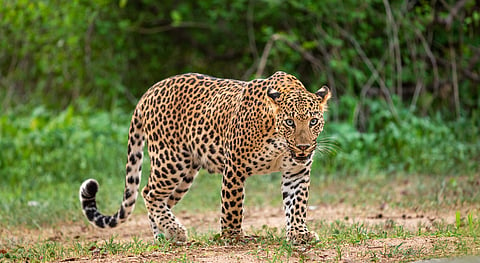

Big cat species like leopards are facing high risks since poachers and wildlife traffickers are starting to consider them as substitutes to meet the growing international demand for tiger parts, an animal welfare organisation has warned.
Four Paws, a global welfare organisation that works towards rescue and protection of wild animals, said leopard parts are being purposely mislabelled and traded under the garb of ‘tiger’ bones, teeth, skull and skins. These parts are in high demand in the wildlife markets of Asia for traditional medicine, luxurious accessories, trophies, etc. Live animals are also being traded as pets.
The organisation pointed out that despite the pressure on wild leopard populations and receiving the strictest protection under the Convention on International Trade in Endangered Species of Wild Fauna and Flora (CITES), around 12,000 leopards and their parts were traded between 2020 and 2023 worldwide, according to the CITES database.
A statement from Four Paws added that leopards across Africa, the Middle East and Asia have been decimated from nearly 75 per cent of their natural habitat, owing to poaching and habitat loss.
“While wild big cat populations are at the brink of extinction, others are bred in questionable breeding facilities for the sole purpose of being traded across the world — alive or as body parts. It is tragic to see how these creatures have turned into mere commodities,” said Vanessa Amoroso, head of wild animals in trade at Four Paws.
South Africa continues to play a crucial role in fuelling the demand for big cats and their parts through its intensive captive breeding industry by taking advantage of weak legislation, thereby encouraging illegal trade of big cat species.
“South Africa’s intensive big cat captive breeding industry has turned the country into a major actor in the global big cat trade, supplying the growing international demand for big cat species,” according to the statement.
“The protection of big cats is not uniform across the world and varies from country to country. It even varies between big cat species. Wildlife traffickers and dealers are aware of this and always on the search for easy solutions to make money: If getting a tiger is too complicated, they will quickly move on to more accessible and less protected substitutes,” the statement said.
Amoroso urged global support to end the vicious cycle of supply and demand by urging governments all over the world to comply with the international standards of wild animal protection as per CITES provisions.